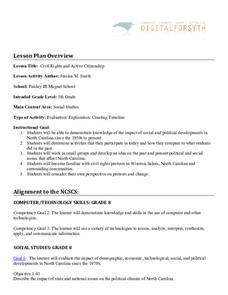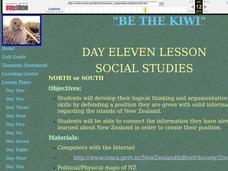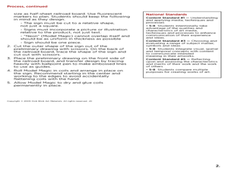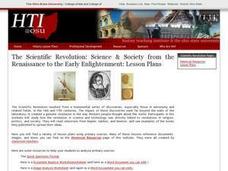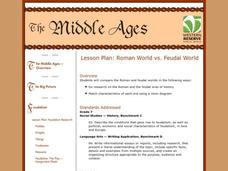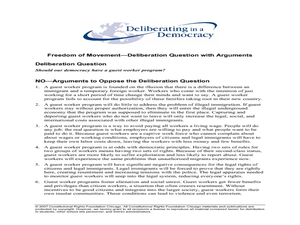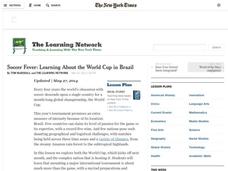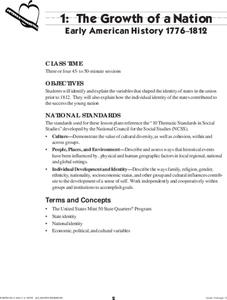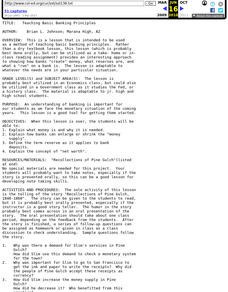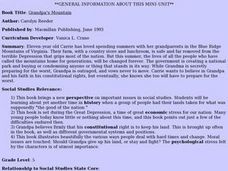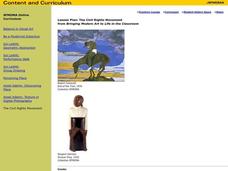Digital Forsyth
Civil Rights and Active Citizenship
As part of a study of the American Civil Rights movement, class members search the Internet to find important facts, people, events, and pictures that they use to create a timeline of events between 1955 and 1970.
Curated OER
Be the Kiwi
Compare the North and South of New Zealand. Exploritive minds identify which island is better to live on, taking into consideration such things as social, political, and economic aspects. They research an argument to present and debate...
Curated OER
Neon Signs
Middle schoolers study a commercial art form and explore its historic and social meaning. They apply linear color to a shape, bending and forming the lines in much the same way a sign artist would form glass tubing. They design their own...
Curated OER
The Scientific Revolution
Scientists participate in studying how new scientific advances have changed the world. They explain how astronomers have changed the way people view the universe, summarize the advances that were made in chemistry and medicine, and...
Curated OER
Chapter 23: Pure Competition
Taking your young economists through the characteristics of four market models (Pure Competition, Pure Monopoly, Oligopoly, and Monopolistic Competition), this presentation uses both charts and graphs to illustrate the necessary...
Northeastern Educational Television of Ohio, Inc.
Roman World vs. Feudal World
Young historians compare the major features of the Roman and feudal worlds, such as religion, social hierarchy, and political tenets, using online resources and group discussion.
Deliberating in a Democracy
Freedom of Movement
Class members examine human migration. For this population lesson, they read an article entitled, "Freedom of Movement" and respond to discussion questions about the article related to guest worker programs.
Curated OER
Chapter 11: Aggregate Demand and Aggregate Supply
Bring the intricacies of the Aggregate Demand-Aggregate Supply Model (AD-AS) to life in this detailed - yet understandable - presentation. Viewers will appreciate the clear explanations and graphs as they begin their adventure through...
Curated OER
Chapter 27: The Demand for Resources
A good resource to a lecture on resource demand and marginal productivity, this economics presentation is easy to understand, even for beginners. A list of key terms at the end of the slideshow summarizes the instructional activity, and...
Curated OER
Chapter 21: Consumer Behavior and Utility Maximization
Who knows why consumers act the way they do? After viewing this presentation, your class will - and they will also know how to optimize consumer behavior. Prepare your young captains of industry for their place in the world of business...
Curated OER
Chapter 15: Monetary Policy
Even well-versed economists will appreciate the clarity and cohesiveness of this presentation. Covering monetary policy and open-market operations with bullet points and graphs, these slides would be a good addition to both a basic and...
Curated OER
Chapter 20: Demand and Supply (Elasticities and Government-Set Prices)
Discussing first the elasticity of demand and then the element of supply, these slides present graphs and bullet points that would easily supplement your economics lecture. Viewers will appreciate the pacing of the slides, making it easy...
The New York Times
Soccer Fever: Learning About the World Cup in Brazil
What an incredible collection of ideas for teaching about the 2014 World Cup in Brazil! This resource is packed with news articles and instructional activities on a wide variety of topics, from the global popularity of soccer and the...
Tidewater Community College
Assignment: The “Big Mac” Index
Young economists learn about the method of predicting changes in the exchange rate with Big Macs in an instructional video. After an understanding the index, learners write a post on a discussion board and respond to class members' posts...
Curated OER
Chapter 30: Government and Market Failure
Complete with a navigation tool and list of key terms, the slides in this presentation are bursting with pertinent information for your young economists. From studying public goods to graphs that detail the collective willingness to pay,...
US Mint
The Growth of a Nation
Young historians explore the identity of the early United States in this four-part instructional activity series. Working in groups of three, students research the political, economic, and cultural atmosphere of each member of the...
Curated OER
The Chinese economic and political model.
Ninth graders study the unique and economic and political model of modern day People's Republic of China. They make an effort to determine if the unique brand of socialism with a market-type economy as currently practiced is ...
Curated OER
Teaching Basic Banking Principles
Students listen to the story, "Recollections of Pine Gulch, 1840-1860" to determine how banks "create" money, what reserves are, and what a "run" on a bank is.
Curated OER
The Public Choices of Senator Aspyer Tu Moore
Pupils role play roles of people in the life of Aspyer Tu Moore. They analyze his public choices and solve a problem related to them. They answer questions to end the lesson.
National First Ladies' Library
The First Great Awakening
Connecting social studies and American literature, students study the Great Awakening and draw comparisons between its impact on England and on parts of Colonial America. They research the lives and experiences of people who lived during...
Curated OER
Grandpa's Mountain
Fifth graders read the book Grandpa's Mountain and discuss how land was taken away for "the good of the country". In this social studies lesson plan, 5th graders then create a newspaper, poster, poetry, interviews, surveys, or other...
Curated OER
What Can We Learn about India from a Ten Rupee Bank Note?
The class finds and cites evidence showing India's unity in diversity and work to recognize some of the complex interactions of a civilized community. They read to understand how geography, history, politics, economics, beliefs, and...
Curated OER
"Wedding Celebrations Around The World"
Ninth graders research the cultural implications of wedding celebrations around the world. They study wedding celebrations before creating world map on which they place an appropriately attired wedding couple on the country they studied....
Curated OER
The Civil Rights Movement
Young scholars compare and contrast African-American, Asian-American, Chicano and Native-American movements with the civil rights movement and are exposed to the sociopolitical and economic factors involved in the rise of social movements.


